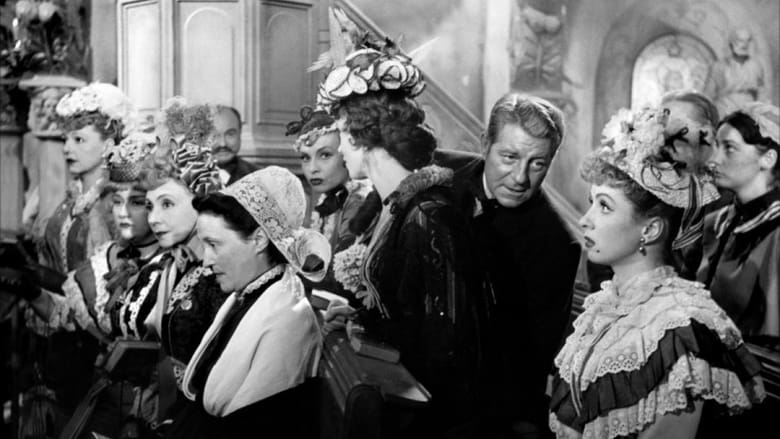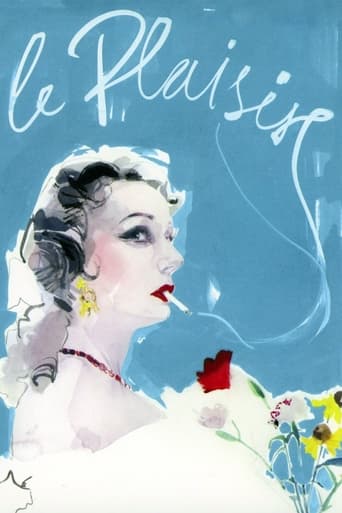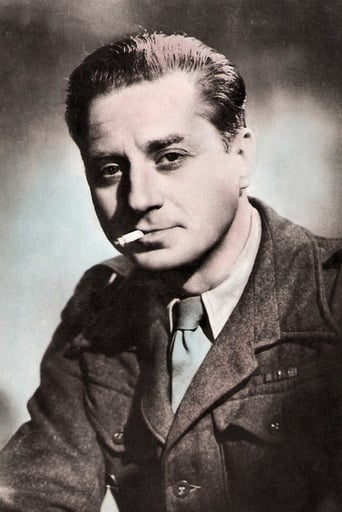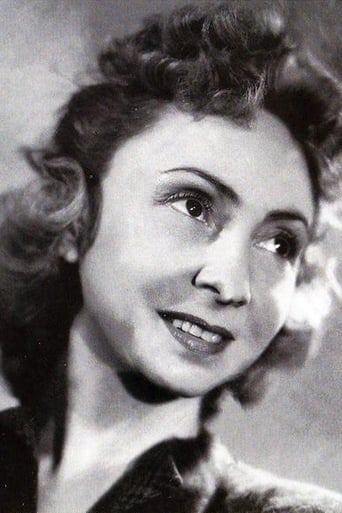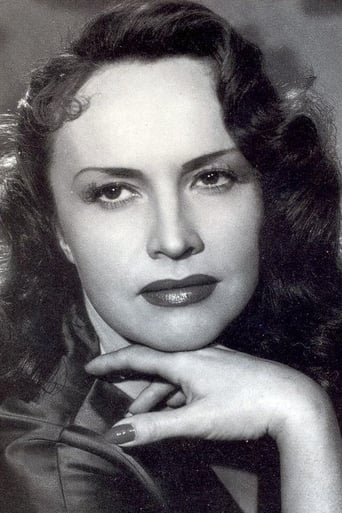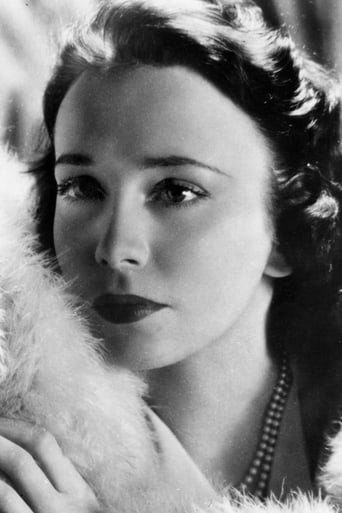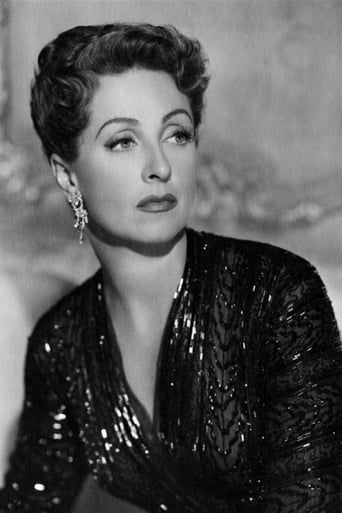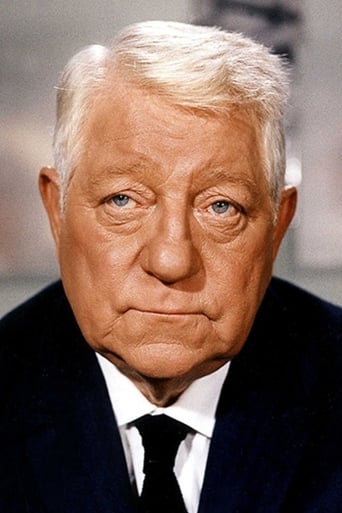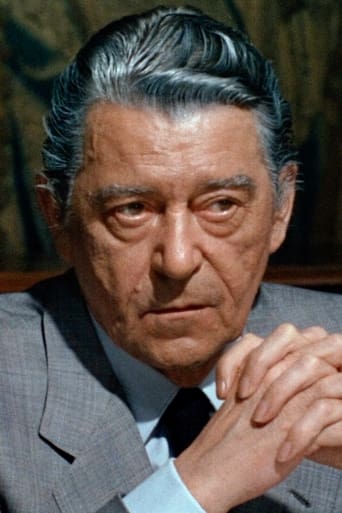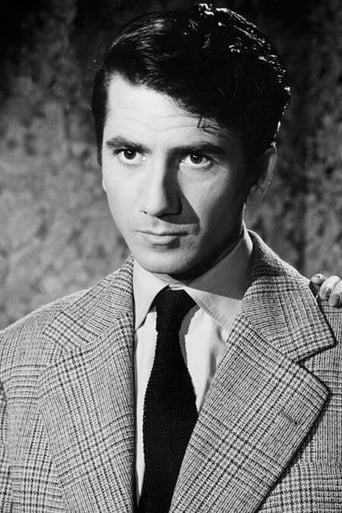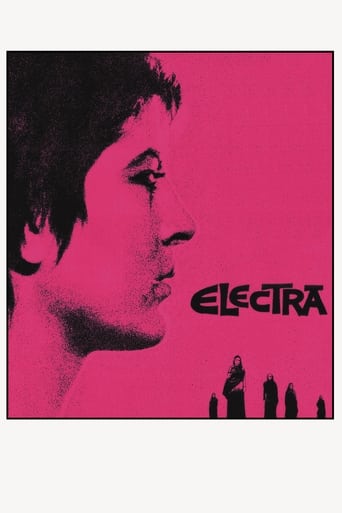Three stories about the pleasure. The first one is about a man hiding his age behind a mask to keep going to balls and fancying women - pleasure and youth. Then comes the long tale of Mme Tellier taking her girls (whores) to the country for attending her niece's communion - pleasure and purity. And lastly, Jean the painter falling in love with his model - pleasure and death.
You May Also Like
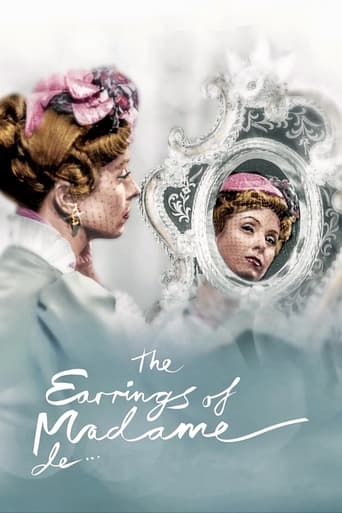
Reviews
I wanted to but couldn't!
Great movie. Not sure what people expected but I found it highly entertaining.
There's no way I can possibly love it entirely but I just think its ridiculously bad, but enjoyable at the same time.
It's the kind of movie you'll want to see a second time with someone who hasn't seen it yet, to remember what it was like to watch it for the first time.
For me viewing 'Le Plaisir' in the DVD format happened by chance, as I knew nothing about Max Ophuls and the film until then. And what a surprise! It is good old-fashioned story telling (three stories) with a movie camera, in black and white. If not done right this can be a very boring exercise, but not with Le Plaisir.Story 1 about an old man putting on a mask to look young is probably the weakest story of the three. Story 2 about several women of pleasure taking time off in the country side is my favourite. All in all, the film is definitely engaging and the stories were well told. Max Ophuls, whom I knew nothing about, is on my watch list.A very enjoyable film for a quiet evening.
There is a certain mood that I am subject to which can be satisfied only by a sunny, quiet, late Sunday afternoon on the couch with Maupassant. (I suspect that Proust would do even better but I lack the stamina.) My wife and I discovered Ophuls by watching The Earings of Madame de... on instant Netflix. When I saw that Le plaisir was Maupassant my heart leaped and, after viewing it, I can now report that the film is as exquisite as the stories themselves (minus the soft Sunday afternoons, of course).The film contains three stories each of which depict an aspect of pleasure: the pleasure of youth, the pleasure of innocence and the pleasure of fate.The second tale, La maison Tellier ('Madame Tellier's Establishment' in my translated collection of Maupassant stories) is the centerpiece of the film. It describes a trip to a small country village by a madame and her platoon of lovable ladies in order to attend the first communion of her nephew where pleasure meets innocence. The scene in the church where Rosa, overcome with memories of her lost innocence, starts to weep and then everyone in the church is soon weeping, is one of the most poignant I have ever seen on film. It is a depiction not only of the seriousness of lost innocence but it's universality as well and serves to show Rosa's sins, on display for all to see, joined in one spontaneous flood of remorse and gratitude by the hidden sins of all the respectable village folk. See if you don't fall into tears as well.If you have not read Maupassant, doing so before viewing the film will heighten your enjoyment. For those who have decided to view the four major Ophuls films, I offer the opinion that this is the best of them and would be a good place to start.Social Commentary: Never having visited France, I cannot say whether the charming French idea of innocent naughtiness has given that country a better life. But if the concept of 'a little sin is the spice of life' adds something to the life of the well off (and I doubt it), it certainly does not work for the poor. Drive through any blighted urban neighborhood for the proof. So-called rigid bourgeois values may not make for good stories or movies but they are essential for those who have it in mind that their children do well in school and go on to live decent lives. Enjoy these stories and, yes, acknowledge the hypocrisy of middle class morality, but do not transplant la belle vie into your own family or you will live to regret it.
Max Ophuls' indulgence in mobile camera work is given its utmost fulfillment and flourish in his adaptation of three stories by popular 19th-century French writer Guy de Maupassant, considered one of the fathers of the modern short story. There is largely a rationalization for what may seem like intemperance: Ultimately, life is motion, so this continual progression is the intonation of a notion that doesn't exist in physical form. An enthusiast for immutable motion, Ophuls knew that, due to its pure texture, existence can never be entirely fulfilling, finished, or conclusively satisfied. His world is full of inextricable oppositions, a feature most overtly drawn out in the middle segment of this hilarious, melancholy amalgam. That is why, whether or not one interprets the end as a happy note, it commemorates life.One can trace, throughout the three tales, a clear-cut evolution in the women's statuses. The wife in the first story, embittered, deserted at home every night while her aging husband frolics in the nearby palais de danse in his escapist mask of youth, is completely involved in his compulsion, even content with him in her serfdom. The women of the middle episode are prostitutes in the town brothel, shown as a crucial community establishment, exercising a kind of control over men and, in the instance of Madame Rosa, beginning to spy promise free of the brothel. In the third story, the woman, acting out against the painter and lover who has retained her like a vendible, defies in the sole manner available to her.Admirable in their cleverness, rigor and craftsmanship as the surrounding segments are, it is the middle episode whose pleasure, assured by the movie's title, is most affectingly troubled by inferences, by a feeling of defeat surrounded by merriment, by underflows of dissolution. What is introductory is decidedly presented as a usual night. What follows is decidedly unusual: a night when the lights are out, the den is forsaken, and society falls apart. Within minutes, the businessmen, the town hotshots, their evening's escapade turned down, are fighting, fussing, nearly waging war. When eventually they dissolve, one straggler finds the solution, on a paper that has dropped from the door. The whole bunch has gone on a daylong trip to the country, to be at the first Communion of one of the madames' young niece. The central tale reverberates, in model, the triangular form of the film.A single transient twinkle of shared bedroom eyes is at the crux of Ophuls' arrangement of Maupassant's narrative trifecta. One might say that this lavish tragifarce is structured around it: The sole benign love match in the entire film, and indeed hopeless to attain, the categorical Ophuls love story, nipped in the bud by both an elderly wife and business priorities. Going outward from this axial bond, Ophuls gives us the two train journeys, to and from the country. Being is moving.
A trilogy of Guy de Maupassant stories, two short simple ones framing a long and impossibly rich one, and I don't know why everyone complains about the framing ones - everything is given exactly the weight that their narrative will support. An old man dressing up like a young dandy to relive the gavotting excesses of his youth, only to end in physical collapse, starts things off; and to close we have a beautiful young couple who go from romantic bliss to petty vindictiveness to resigned acceptance via an attempted suicide. This gives us a rather complex understanding of the meaning of 'pleasure', and the worst you can say is that one and three don't utterly embody pleasure the way number two does (although the swirling camera work in the dance scene comes damn close). The story of a troop of sex workers romping off to a country wedding is simplicity itself, but also incredibly rich - full of memorable human beings and interactions. Everyone sees happiness in the place that they're not, but this episode celebrates life wherever it finds it, and it's a joy to watch.
Top Streaming Movies











